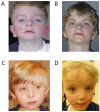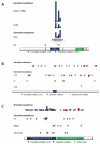Prioritization of neurodevelopmental disease genes by discovery of new mutations
- PMID: 24866042
- PMCID: PMC4077789
- DOI: 10.1038/nn.3703
Prioritization of neurodevelopmental disease genes by discovery of new mutations
Abstract
Advances in genome sequencing technologies have begun to revolutionize neurogenetics, allowing the full spectrum of genetic variation to be better understood in relation to disease. Exome sequencing of hundreds to thousands of samples from patients with autism spectrum disorder, intellectual disability, epilepsy and schizophrenia provides strong evidence of the importance of de novo and gene-disruptive events. There are now several hundred new candidate genes and targeted resequencing technologies that allow screening of dozens of genes in tens of thousands of individuals with high specificity and sensitivity. The decision of which genes to pursue depends on many factors, including recurrence, previous evidence of overlap with pathogenic copy number variants, the position of the mutation in the protein, the mutational burden among healthy individuals and membership of the candidate gene in disease-implicated protein networks. We discuss these emerging criteria for gene prioritization and the potential impact on the field of neuroscience.
Figures




References
-
- De Ligt J, et al. Diagnostic exome sequencing in persons with severe intellectual disability. N. Engl. J. Med. 2012;367:1921–9. - PubMed
-
- Rauch A, et al. Range of genetic mutations associated with severe non-syndromic sporadic intellectual disability: an exome sequencing study. Lancet. 2012;380:1674–82. - PubMed
Publication types
MeSH terms
Grants and funding
LinkOut - more resources
Full Text Sources
Other Literature Sources
Medical

